外研版八年级英语上册Module11Unit 2 In England, you usually drink tea with milk.精品课件 (共31张PPT)
文档属性
| 名称 | 外研版八年级英语上册Module11Unit 2 In England, you usually drink tea with milk.精品课件 (共31张PPT) |
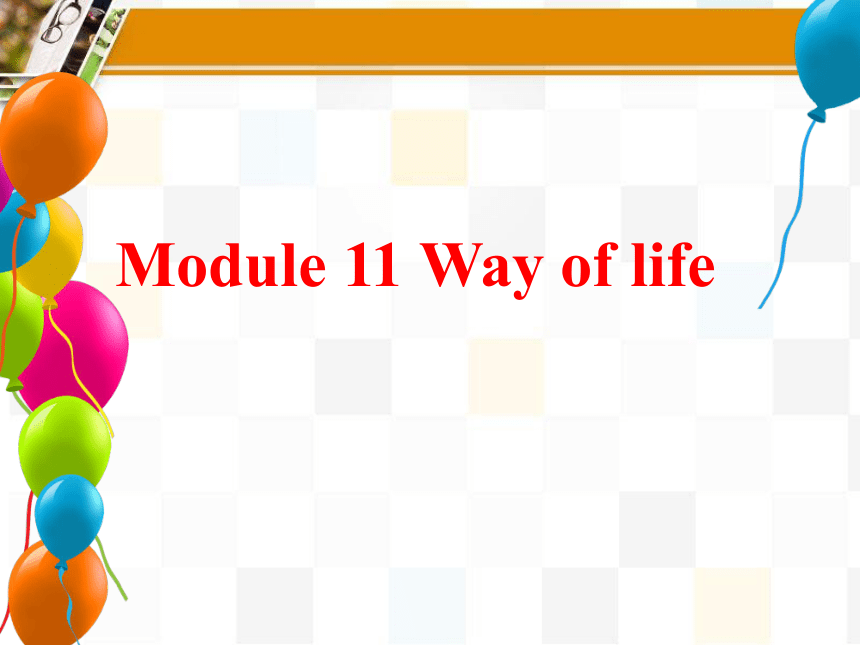
|
|
| 格式 | zip | ||
| 文件大小 | 2.7MB | ||
| 资源类型 | 教案 | ||
| 版本资源 | 外研版 | ||
| 科目 | 英语 | ||
| 更新时间 | 2016-11-23 00:00:00 | ||
图片预览

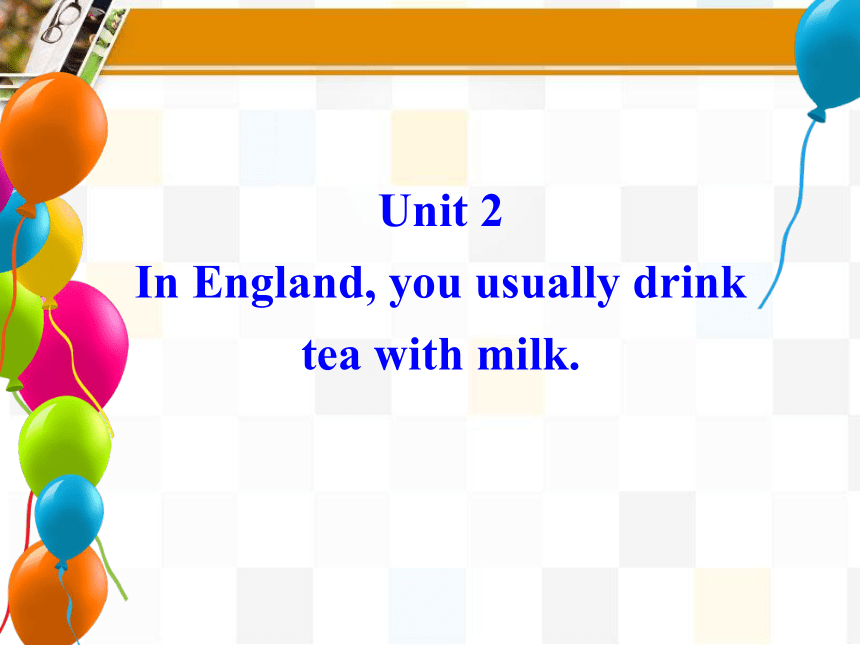
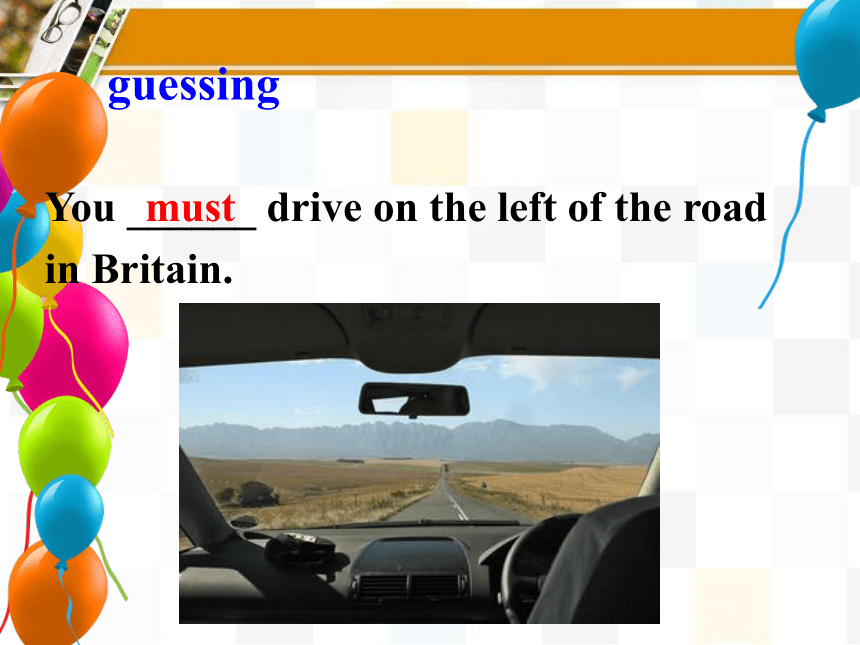
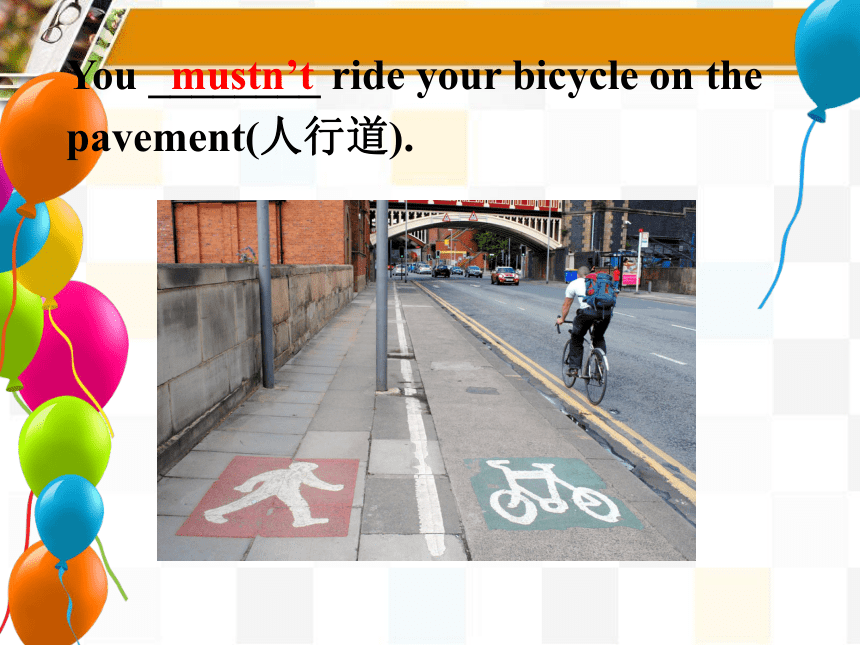
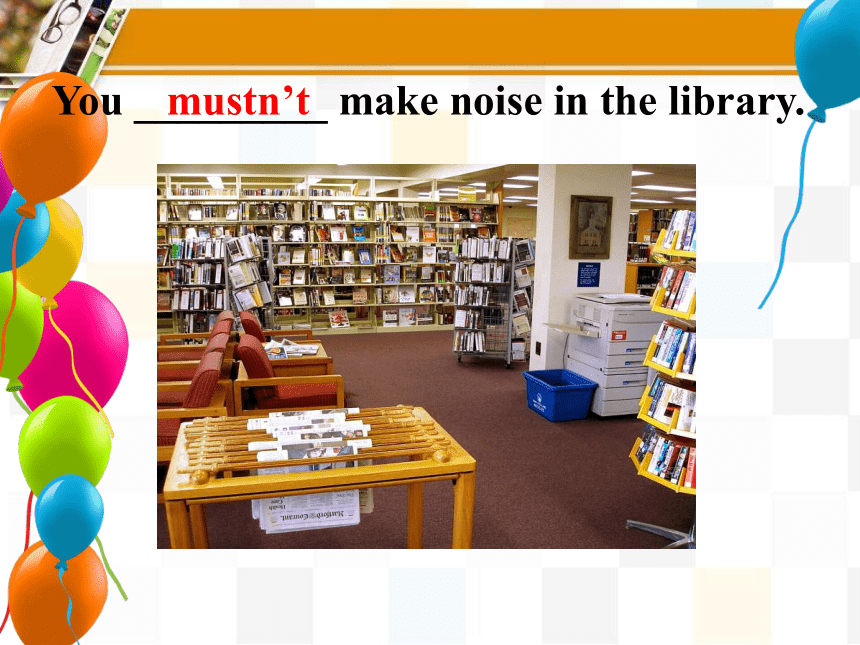
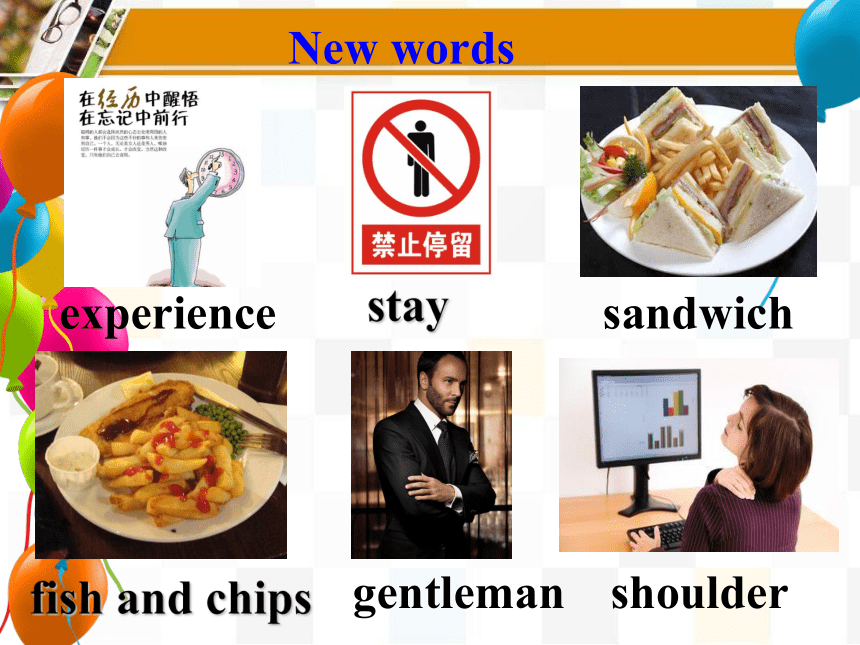



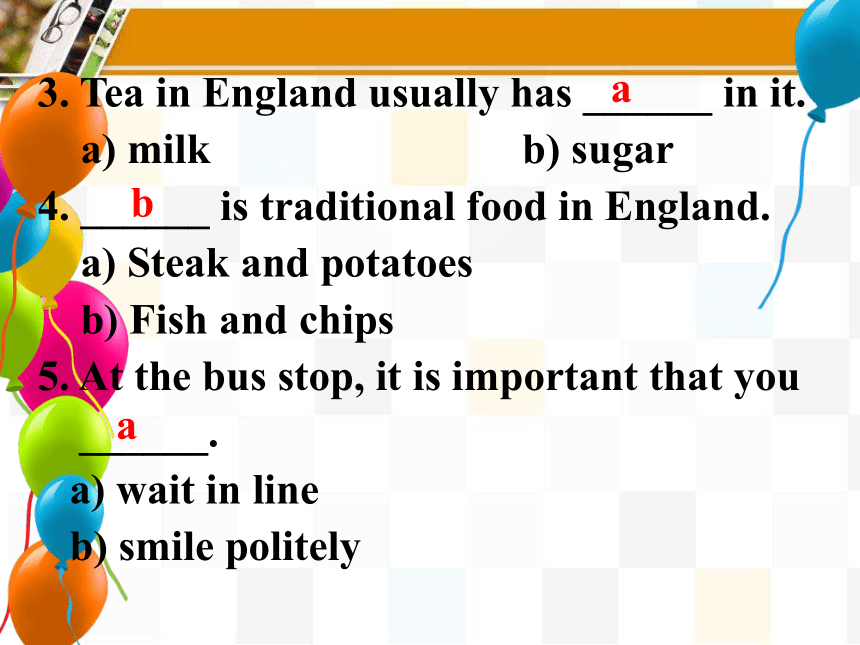

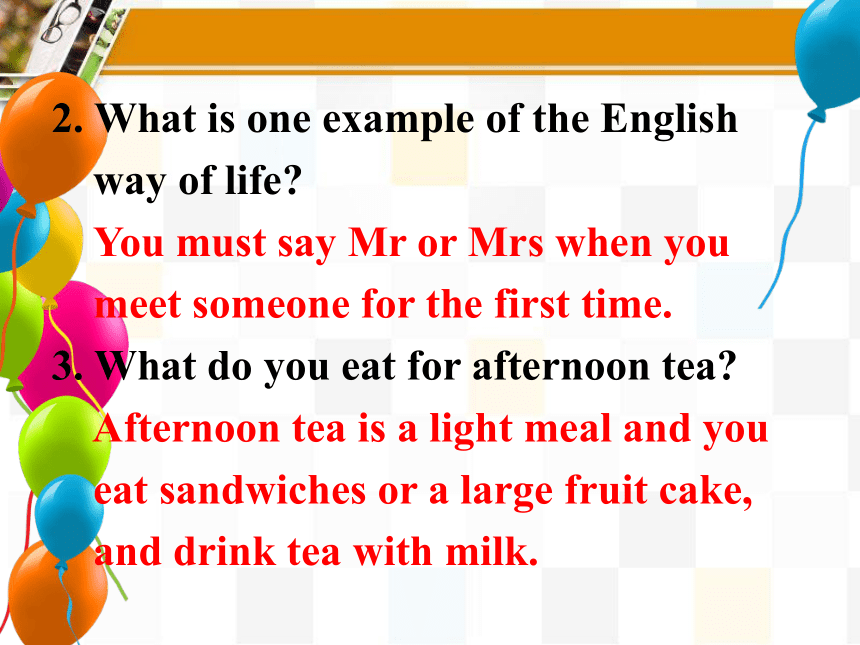
文档简介
课件31张PPT。Module 11 Way of life Unit 2
In England, you usually drink tea with milk.You ______ drive on the left of the road in Britain.mustguessingYou ________ ride your bicycle on the pavement(人行道).mustn’tYou _________ make noise in the library.mustn’tsandwichshoulderexperiencestaygentlemanfish and chipsNew wordsWork in pairs. Look at the pictures
and talk about what you can see. When do people have afternoon tea in Britain?
At around 4 p.m.
2. What is the traditional food in England?
Fish and chips.Reading1. When you are talking to your friends, you may call them ______.
a) by their first names b) Mr or Ms
2. When you are invited for afternoon tea, you will have _____.
a) tea b) a light mealab3. Tea in England usually has ______ in it.
a) milk b) sugar
4. ______ is traditional food in England.
a) Steak and potatoes
b) Fish and chips
5. At the bus stop, it is important that you ______.
a) wait in line
b) smile politelyabafor the first time meal meet
something interesting stand in a line take away 1. What did Wang Hui notice when he was in England?
He noticed something interesting
with the English way of life.2. What is one example of the English way of life?
You must say Mr or Mrs when you meet someone for the first time.
3. What do you eat for afternoon tea?
Afternoon tea is a light meal and you eat sandwiches or a large fruit cake, and drink tea with milk.4. How can you eat fish and chips?
You can eat fish and chips in shops or take it away and eat it with your fingers.
5. What do people do when they wait for the bus?
When people wait for the bus, they need to stand in a line and wait for their turn.1. For example, you must say Mr and Mrs when you meet someone for the first time.
someone pron. 某人;有人
e.g. I seem to hear someone knocking at
the door.
我好像听到有人在敲门。Language pointsfor the first time表示“初次,第一次”。
e.g. I met him at the cinema for the first
time.
我第一次碰到他是在电影院里。2. Afternoon tea is not just a drink but a light meal at around 4 pm.
not just … but …表示“不仅仅……而且……”
e.g. He is not just a teacher but an
inventor.
他不仅是位老师,而且还是个发
明家。3. … or you can take it away and eat it with your fingers!
take away在这里特指将餐馆的食品带走,而不是在餐馆食用。
e.g. — Would you eat it here or take it
away?
— I’ll take it away.
— 你是想在这里吃,还是带走?
— 我要带走。因此在英国,外卖食品被称为“takeaway”
e.g. The restaurant provides takeaway
service.
这个饭店提供外卖服务。4. Once I noticed a gentleman touch a young man on the shoulder…
touch sb. on the should 表示“拍某人的肩膀”,是英语的惯用表达,其他类似的表达例子如:
pat sb. on the head 拍某人的头
kick sb. in the leg 踢某人的腿1. What do you do when you meet people for the first time?
We may shake hands with or smile at each other when we meet for the first time.
2. What must you say when you talk to older people?
We must use “nin” to show our respect.Answer questions3. What food and drink do you give to visitors when they come to your home?
We will serve the visitors with tea, fruits and snacks.
4. What do you eat during the Spring Festival?
We will have a big meal with our family during the Spring Festival. People may have lots of meat at the meal.WritingPeople in my home town are friendly to each other. They may shake hands with or smile at each other when they meet for the first time. When they’re introduced to someone older, they usually use “nin” to show their respect, when there are vistors at home, the host will serve them with tea, fruits and snacks.Possible answerThe Spring Festival is the biggest occasion in my home town. People usually celebrate it by having a big meal with their families. They’ll have lots of meat. Children will enjoy the fireworks and snacks.need的用法
need作为情态动词表示“需要”,可用于肯定句、否定句和疑问句。否定形式needn’t比较常用,表示“不需要”,或“不必要”。例如:
You needn’t wait.
你不需要等待。Grammar请注意:
need也可以作为行为动词,表示“需要”,常用need to do sth.结构。例如:
I need to clean my room immediately.
我需要立即打扫我的屋子。had better的用法
had better表示劝告或建议,意为“最好……”。
例如:
You’d better speak in a low voice.
你最好低点说话。had better一般不用于疑问句中,但可用于否定句中,其否定形式为:had better not.
例如:
You’d better not go out before you
finish your homework.
在完成你的家庭作业之前,最好不要出去。1. It rained heavily, so we ___ stay at home watching TV all day.
A. could B. had to C. must
2. — May I take the book out of the
reading room?
— No, you can’t. You ___ read it here.
It’s the rule.
A. must B. would C. may BA练习3. — Dad, may I watch TV?
— No. You __ finish your homework first.
A. must B. can C. may
4. — Bob, shall we go and meet our new
classmate?
— Sorry. I'm busy now. But you ____ ask
David to go with you. He is free.
A.need B.may C.mustABWrite a passage to describe what you should do at the bus stop.Homework
In England, you usually drink tea with milk.You ______ drive on the left of the road in Britain.mustguessingYou ________ ride your bicycle on the pavement(人行道).mustn’tYou _________ make noise in the library.mustn’tsandwichshoulderexperiencestaygentlemanfish and chipsNew wordsWork in pairs. Look at the pictures
and talk about what you can see. When do people have afternoon tea in Britain?
At around 4 p.m.
2. What is the traditional food in England?
Fish and chips.Reading1. When you are talking to your friends, you may call them ______.
a) by their first names b) Mr or Ms
2. When you are invited for afternoon tea, you will have _____.
a) tea b) a light mealab3. Tea in England usually has ______ in it.
a) milk b) sugar
4. ______ is traditional food in England.
a) Steak and potatoes
b) Fish and chips
5. At the bus stop, it is important that you ______.
a) wait in line
b) smile politelyabafor the first time meal meet
something interesting stand in a line take away 1. What did Wang Hui notice when he was in England?
He noticed something interesting
with the English way of life.2. What is one example of the English way of life?
You must say Mr or Mrs when you meet someone for the first time.
3. What do you eat for afternoon tea?
Afternoon tea is a light meal and you eat sandwiches or a large fruit cake, and drink tea with milk.4. How can you eat fish and chips?
You can eat fish and chips in shops or take it away and eat it with your fingers.
5. What do people do when they wait for the bus?
When people wait for the bus, they need to stand in a line and wait for their turn.1. For example, you must say Mr and Mrs when you meet someone for the first time.
someone pron. 某人;有人
e.g. I seem to hear someone knocking at
the door.
我好像听到有人在敲门。Language pointsfor the first time表示“初次,第一次”。
e.g. I met him at the cinema for the first
time.
我第一次碰到他是在电影院里。2. Afternoon tea is not just a drink but a light meal at around 4 pm.
not just … but …表示“不仅仅……而且……”
e.g. He is not just a teacher but an
inventor.
他不仅是位老师,而且还是个发
明家。3. … or you can take it away and eat it with your fingers!
take away在这里特指将餐馆的食品带走,而不是在餐馆食用。
e.g. — Would you eat it here or take it
away?
— I’ll take it away.
— 你是想在这里吃,还是带走?
— 我要带走。因此在英国,外卖食品被称为“takeaway”
e.g. The restaurant provides takeaway
service.
这个饭店提供外卖服务。4. Once I noticed a gentleman touch a young man on the shoulder…
touch sb. on the should 表示“拍某人的肩膀”,是英语的惯用表达,其他类似的表达例子如:
pat sb. on the head 拍某人的头
kick sb. in the leg 踢某人的腿1. What do you do when you meet people for the first time?
We may shake hands with or smile at each other when we meet for the first time.
2. What must you say when you talk to older people?
We must use “nin” to show our respect.Answer questions3. What food and drink do you give to visitors when they come to your home?
We will serve the visitors with tea, fruits and snacks.
4. What do you eat during the Spring Festival?
We will have a big meal with our family during the Spring Festival. People may have lots of meat at the meal.WritingPeople in my home town are friendly to each other. They may shake hands with or smile at each other when they meet for the first time. When they’re introduced to someone older, they usually use “nin” to show their respect, when there are vistors at home, the host will serve them with tea, fruits and snacks.Possible answerThe Spring Festival is the biggest occasion in my home town. People usually celebrate it by having a big meal with their families. They’ll have lots of meat. Children will enjoy the fireworks and snacks.need的用法
need作为情态动词表示“需要”,可用于肯定句、否定句和疑问句。否定形式needn’t比较常用,表示“不需要”,或“不必要”。例如:
You needn’t wait.
你不需要等待。Grammar请注意:
need也可以作为行为动词,表示“需要”,常用need to do sth.结构。例如:
I need to clean my room immediately.
我需要立即打扫我的屋子。had better的用法
had better表示劝告或建议,意为“最好……”。
例如:
You’d better speak in a low voice.
你最好低点说话。had better一般不用于疑问句中,但可用于否定句中,其否定形式为:had better not.
例如:
You’d better not go out before you
finish your homework.
在完成你的家庭作业之前,最好不要出去。1. It rained heavily, so we ___ stay at home watching TV all day.
A. could B. had to C. must
2. — May I take the book out of the
reading room?
— No, you can’t. You ___ read it here.
It’s the rule.
A. must B. would C. may BA练习3. — Dad, may I watch TV?
— No. You __ finish your homework first.
A. must B. can C. may
4. — Bob, shall we go and meet our new
classmate?
— Sorry. I'm busy now. But you ____ ask
David to go with you. He is free.
A.need B.may C.mustABWrite a passage to describe what you should do at the bus stop.Homework
同课章节目录
- Module 1 How to learn English
- Unit 1 Let's try to speak English as much as possi
- Unit 2 You should smile at her.
- Unit 3 Language in use .
- Module 2 My home town and my country
- Unit 1 It's taller than many other buildings.
- Unit 2 Cambridge is a beautiful city in the east o
- Unit 3 Language in use .
- Module 3 Sports.
- Unit 1 Nothing is more exciting than playing tenni
- Unit 2 This year we training more carefully.
- Unit 3 Language in use .
- Module 4 Planes, ships and trains .
- Unit 1 He lives the farthest from school.
- Unit 2 What is the best way to travel.
- Unit 3 Language in use .
- Module 5 Lao She Teahouse.
- Unit 1 I wanted to see the Beijing Opera.
- Unit 2 It descibes the changes in Chinese society.
- Unit 3 Language in use .
- Module 6 Animals in danger.
- Unit 1 It allows people to get closer to them .
- Unit 2 The WWF is working hard to save them all.
- Unit 3 Language in use .
- Revision module A
- Module 7 A famous story
- Unit 1 Alice was sitting with her sister by the ri
- Unit 2 She was thinking about her cat.
- Unit 3 Language in use .
- Module 8 Accidents
- Unit 1 While the car were changing to red, a car s
- Unit 2 I was trying to pick it up when it bite me
- Unit 3 Language in use .
- Module 9 Population
- Unit 1 The population of China is about 1.37 billi
- Unit 2 Arnwick was a city with 200,000 people.
- Unit 3 Language in use .
- Module 10 The weathe
- Unit 1 It might snow.
- Unit 2 The weather is fine all year round.
- Unit 3 Language in use .
- Module 11 Way of life
- Unit 1 In China ,we open a gift later.
- Unit 2 In England, you usually drink tea with milk
- Unit 3 Language in use .
- Module 12 Help
- Unit 1 What should we do before help arrives?
- Unit 2 Stay away from windows and heavy furniture.
- Unit 3 Language in use .
- Revision module B
